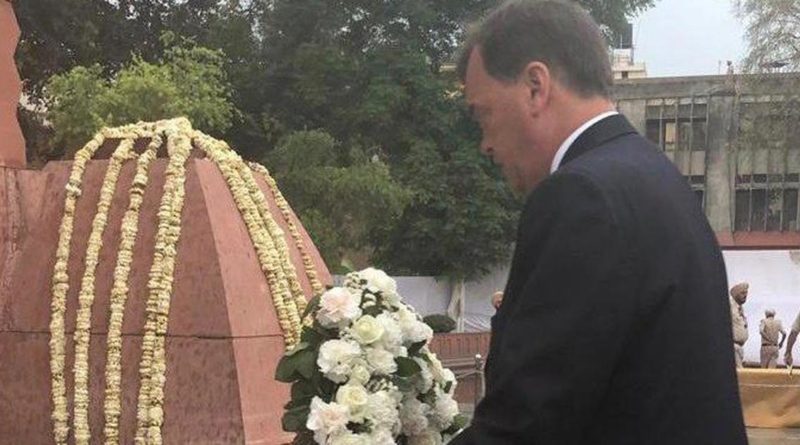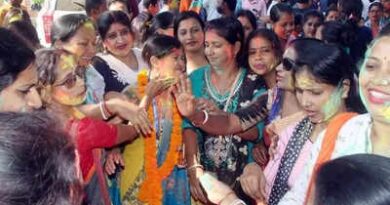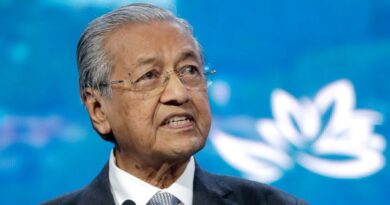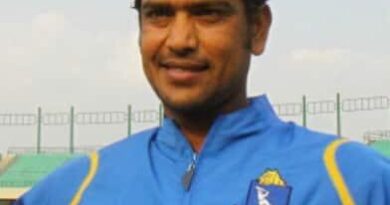UK H C Visits Jallianwala Bagh Memorial, Expresses ‘Deep Regret ‘For ‘Shameful Act’
BRITISH High Commissioner to India, Sir Dominic Asquith, on Saturday visited the memorial to the Jallianwala Bagh massacre committed by the troops as ordered by Colonel Reginald Dyer on Baishakhi on Sunday, April 13, 1919. Saturday marks the centenary of the tragedy. India was then under British rule .The massacre is stated to be one of the darkest chapters of India’s freedom struggle against the British occupation. The official death toll given by the British government was put at 379 killed though there were claims that over 1,000 people were killed. The Jallianwala Bagh massacre, also known as the Amritsar massacre, occurred near Golden Temple, the holiest shrine of the Sikh community when troops of the British Indian Army under the command of Colonel Reginald Dyer fired rifles on a crowd of Indians. The civilians had assembled for a peaceful protest to condemn the arrest and deportation of two national leaders, Satya Pal and Saifuddin Kitchlew. Raja Ram has argued however, that the Proclamation banning assembly of the crowd was ineffective, the crowd formed in deliberate defiance and the event signals a beginning of Indian nationalism. The entire nation was in mourning after it came to know about the cold blooded mayhem. Noble Laureate Rabindra Nath Tagore was shocked at the carnage and penned a strongly worded condemnation and gave up Knighthood –Sir-protesting the murders of peaceful people”.The British Government ahead of the centenary of the shameful incident only expressed regret but has not offered any apology, says Punjab Chief Minister Capt Amarinder Singh .He called for an unequivocal official apology from Britain for the massacre. In the visitor’s book, Sir Dominic Asquith wrote: “The events of Jallianwala Bagh 100 years ago today reflect a shameful act in British-Indian history. We deeply regret what happened and the suffering caused. In am pleased today that the UK and India have and remain committed to developing further a thriving 21 century partnership.”Asquith also paid floral tributes at the memorial. Asquith however evaded a direct response when asked by media about offering apology by the UK Government. “I know this is a really important question. I would just ask you to respect what I came here to do which was to commemorate those who died here a 100 years ago — to express the sorrow of the British government and the British people.””What happened 100 years ago was a tragedy. Prime Minister Theresa May in the House of Parliament this week referred to it as a ‘shameful scar’ in our history.”Her predecessor, Prime Minister David Cameroon, when he visited India, referred to it as a deeply shameful scar. My own great grandfather, who was Prime Minister for almost a decade, in 1960 referred to this as one of the worst outrages in our whole history,” he said, adding that both governments (Britain and India) are committed to the flourishing relationship (between both countries),” he said.”Today we remember with deep sorrow those who were killed on April 13, 1919 and regret the suffering caused,” Asquith also tweeted. The victims included several women and children who gathered there to protest against inhuman Rowlatt Act. Prime Minister Narendra Modi tweeted: “Today, when we observe 100 years of the horrific Jallianwala Bagh massacre, India pays tributes to all those martyred on that fateful day. Their valour and sacrifice will never be forgotten. Their memory inspires us to work even harder to build an India they would be proud of.”United Kingdom’s Prime Minister Theresa May had expressed regret for the massacre, but stopped short of a full apology. “We deeply regret what happened and the suffering caused,” May told the British parliament. On April on Wednesday .It is a “shameful scar on British history”, she added. Jeremy Corbyn, leader of the main opposition Labour Party, had called for “a full, clear and unequivocal apology”. It may be recalled that Reginald Dyer after retirement was assassinated by Udham Singh in 1940 in London. Udham Singh, who had witnessed the events in Amritsar and was himself wounded, also shot and killed Michael O’Dwyer, then Lieutenant-Governor of Punjab, for approving Dyer’s action. Meanwhile, The SGPC performed special “Ardas” to commemorate the centenary of the Jallianwala Bagh massacre (edited by Pranab Kumar Chakravarty with inputs from agencies)




